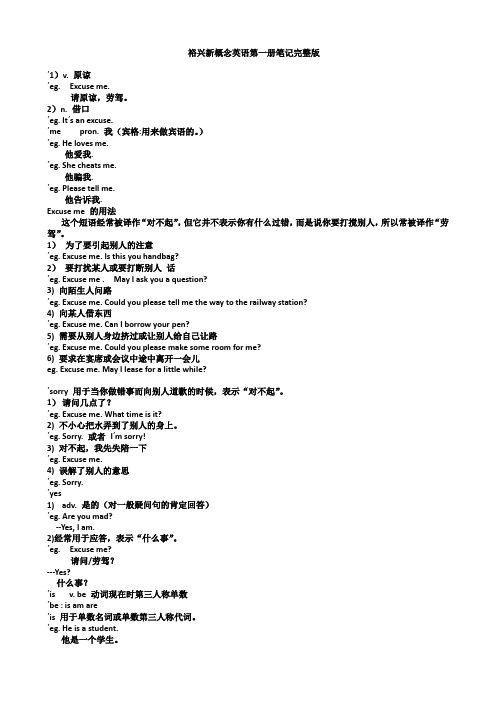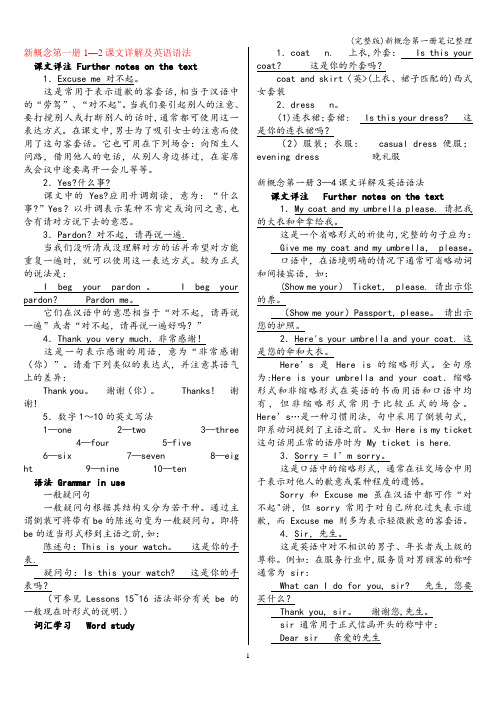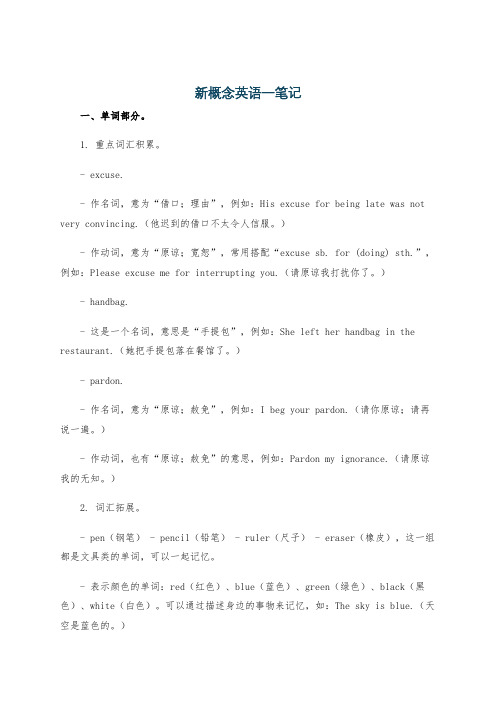新概念英语第一册笔记完整版
裕兴新概念英语第一册笔记(完整版)

裕兴新概念英语第一册笔记完整版΄1)v. 原谅΄eg. Excuse me.请原谅,劳驾。
2)n. 借口΄eg. It΄s an excuse.΄me pron. 我(宾格:用来做宾语的。
)΄eg. He loves me.他爱我.΄eg. She cheats me.他骗我.΄eg. Please tell me.他告诉我.Excuse me 的用法这个短语经常被译作“对不起”,但它并不表示你有什么过错,而是说你要打搅别人,所以常被译作“劳驾”。
1)为了要引起别人的注意΄eg. Excuse me. Is this you handbag?2)要打扰某人或要打断别人话΄eg. Excuse me . May I ask you a question?3) 向陌生人问路΄eg. Excuse me. Could you please tell me the way to the railway station?4) 向某人借东西΄eg. Excuse me. Can I borrow your pen?5) 需要从别人身边挤过或让别人给自己让路΄eg. Excuse me. Could you please make some room for me?6) 要求在宴席或会议中途中离开一会儿eg. Excuse me. May I lease for a little while?΄sorry 用于当你做错事而向别人道歉的时候,表示“对不起”。
1)请问几点了?΄eg. Excuse me. What time is it?2) 不小心把水弄到了别人的身上。
΄eg. Sorry. 或者I΄m sorry!3) 对不起,我先失陪一下΄eg. Excuse me.4) 误解了别人的意思΄eg. Sorry.΄yes1)adv. 是的(对一般疑问句的肯定回答)΄eg. Are you mad?--Yes, I am.2)经常用于应答,表示“什么事”。
(完整版)新概念英语第一册笔记完整版

(完整版)新概念英语第一册笔记完整版新概念英语第一册笔记完整版1)v. 原谅eg. Excuse me. 请原谅,劳驾。
2)n. 借口eg.It?s an excuse.me pron. 我(宾格:用来做宾语的。
)eg. He loves me.他爱我.eg. She cheats me.他骗我.eg. Please tell me.他告诉我.Excuse me 的用法这个短语经常被译作―对不起‖,但它并不表示你有什么过错,而是说你要打搅别人,所以常被译作―劳驾‖。
1)为了要引起别人的注意eg. Excuse me. Is this you handbag?2)要打扰某人或要打断别人话eg. Excuse me . May I ask you a question?3) 向陌生人问路eg. Excuse me. Could you please tell me the way to the railway station?4) 向某人借东西eg. Excuse me. Can I borrow your pen?5) 需要从别人身边挤过或让别人给自己让路eg. Excuse me. Could you please make some room for me?6) 要求在宴席或会议中途中离开一会儿eg. Excuse me. May I lease for a little while?sorry 用于当你做错事而向别人道歉的时候,表示―对不起‖。
1)请问几点了?eg. Excuse me. What time is it?2) 不小心把水弄到了别人的身上。
eg. Sorry. 或者I?m sorry!3) 对不起,我先失陪一下eg. Excuse me.4) 误解了别人的意思?eg. Sorry. ?yes1) adv. 是的(对一般疑问句的肯定回答)eg. Are you mad? --Yes, I am.2)经常用于应答,表示―什么事‖。
新概念英语1课堂笔记

新概念英语1课堂笔记一、单词部分。
1. be动词(am/is/are)- 用法:- am用于第一人称单数I,例如:I am a student.(我是一名学生。
)- is用于第三人称单数(he/she/it和单数名词),如:He is a doctor.(他是一名医生。
),The cat is cute.(这只猫很可爱。
)- are用于第二人称you(单复数同形)以及复数名词和代词,例如:You are my friends.(你们是我的朋友。
),They are teachers.(他们是老师。
)2. 名词(noun)- 可数名词:- 有单复数形式,复数形式的构成规则:- 一般情况加 -s,如book - books,pen - pens。
- 以s, x, ch, sh结尾的加 -es,如bus - buses,box - boxes,watch - watches,brush - brushes。
- 以辅音字母 + y结尾的,把y变为i再加 -es,如baby - babies,city - cities。
- 以f或fe结尾的,把f或fe变为v再加 -es,如knife - knives,wife - wives(但也有一些特殊情况,如roof - roofs)。
- 不可数名词:- 没有复数形式,例如water(水),milk(牛奶),bread(面包)等。
在表示数量时,要用相应的量词词组,如a glass of water(一杯水),a piece of bread (一片面包)。
3. 形容词(adjective)- 用法:用来修饰名词,说明事物或人的特征。
例如:a beautiful flower(一朵美丽的花朵),a tall boy(一个高个子男孩)。
- 形容词的位置:一般放在名词前面,但在某些结构中也可以后置,如something interesting(一些有趣的东西)。
4. 代词(pronoun)- 人称代词:- 主格:I(我),you(你/你们),he(他),she(她),it(它),we(我们),they(他们/她们/它们)。
(完整版)新概念第一册笔记整理

新概念第一册1—2课文详解及英语语法课文详注 Further notes on the text1.Excuse me 对不起。
这是常用于表示道歉的客套话,相当于汉语中的“劳驾”、“对不起"。
当我们要引起别人的注意、要打搅别人或打断别人的话时,通常都可使用这一表达方式。
在课文中,男士为了吸引女士的注意而使用了这句客套话。
它也可用在下列场合:向陌生人问路,借用他人的电话,从别人身边挤过,在宴席或会议中途要离开一会儿等等。
2.Yes?什么事?课文中的 Yes?应用升调朗读,意为:“什么事?”Yes?以升调表示某种不肯定或询问之意,也含有请对方说下去的意思。
3.Pardon?对不起,请再说一遍.当我们没听清或没理解对方的话并希望对方能重复一遍时,就可以使用这一表达方式。
较为正式的说法是:I beg your pardon。
I beg your pardon? Pardon me。
它们在汉语中的意思相当于“对不起,请再说一遍”或者“对不起,请再说一遍好吗?”4.Thank you very much.非常感谢!这是一句表示感谢的用语,意为“非常感谢(你)”。
请看下列类似的表达式,并注意其语气上的差异:Thank you。
谢谢(你)。
Thanks! 谢谢!5.数字1~10的英文写法1—one 2—two 3—three 4—four 5-five6—six 7—seven 8—eig ht 9—nine 10—ten语法 Grammar in use一般疑问句一般疑问句根据其结构又分为若干种。
通过主谓倒装可将带有be的陈述句变为一般疑问句。
即将be的适当形式移到主语之前,如:陈述句:This is your watch。
这是你的手表.疑问句:Is this your watch? 这是你的手表吗?(可参见 Lessons 15~16语法部分有关 be的一般现在时形式的说明.)词汇学习 Word study1.coat n. 上衣,外套: Is this your coat?这是你的外套吗?coat and skirt〈英>(上衣、裙子匹配的)西式女套装2.dress n。
新概念英语一笔记

新概念英语一笔记一、单词部分。
1. 重点词汇积累。
- excuse.- 作名词,意为“借口;理由”,例如:His excuse for being late was not very convincing.(他迟到的借口不太令人信服。
)- 作动词,意为“原谅;宽恕”,常用搭配“excuse sb. for (doing) sth.”,例如:Please excuse me for interrupting you.(请原谅我打扰你了。
)- handbag.- 这是一个名词,意思是“手提包”,例如:She left her handbag in the restaurant.(她把手提包落在餐馆了。
)- pardon.- 作名词,意为“原谅;赦免”,例如:I beg your pardon.(请你原谅;请再说一遍。
)- 作动词,也有“原谅;赦免”的意思,例如:Pardon my ignorance.(请原谅我的无知。
)2. 词汇拓展。
- pen(钢笔) - pencil(铅笔) - ruler(尺子) - eraser(橡皮),这一组都是文具类的单词,可以一起记忆。
- 表示颜色的单词:red(红色)、blue(蓝色)、green(绿色)、black(黑色)、white(白色)。
可以通过描述身边的事物来记忆,如:The sky is blue.(天空是蓝色的。
)二、语法部分。
1. 一般现在时。
- 概念:表示经常发生的动作或存在的状态。
- 结构:- 主语为第三人称单数(he/she/it等)时,动词要加 -s或 -es。
例如:He likes reading books.(他喜欢读书。
)- 主语为第一人称(I)、第二人称(you)和复数(they/we等)时,动词用原形。
例如:I play football every Sunday.(我每个星期天踢足球。
)- 时间状语:often(经常)、usually(通常)、sometimes(有时候)、every day(每天)等。
精心整理新概念英语第一册全套笔记(语法点+配套练习+答案共665页)

Lesson1-2Is this your handbag?一、单词分类二、课文复习Excuse me!Yes?Is this your handbag?Pardon?Is this your handbag?Yes,it is.Thank you very much三、课文重点Thank you very much.=Thanks a lot.Thank you verymuch.You’re welcome./That’s all right.Thanks a lot.四、语法解析1.主格放在句首,作主语宾格放在动词或介词后,作宾语1.I love my mother.She loves me.(I)2.We are family.(we)3.Look at them.They are listening to the teacher carefully.(they)4.Are you(you)Mr.Zhang?5.Mary is waiting for him(he).形物代后跟名词,不能单独存在1.Is this your house?(you)2.I do my homework every day.(I)3.Sally is here.That is her car.(she)4.What is your name?(you)5.Look at my(I)dress.Is it beautiful?名物代用于替代前面提到的名词,后面不再跟名词1.Whose pen is it?It’s his(he).2.My cup is red and yours(you)is blue.3.Is this your handbag?Yes,it’s mine.4.Is that your key?No,it isn’t.It’s hers(she).5.That is not my bike.Mine is new.(I)2.陈述句变一般疑问句--变化规则:1.找到be动词,大写提句首2.人称做变化:my—your,our—your3.其它部分照抄4.句号变问号练习:This is his pen.变一般疑问句Is this his pen?This is her pencil.变一般疑问句Is this her pencil?This is their car.变一般疑问句Is this their car?This is its book.变一般疑问句Is this its book?This is your car.变一般疑问句Is this your car?This is my dog.变一般疑问句Is this your dog?This is our dog.变一般疑问句Is this your dog?五、单词练习1.There is that,here is t his.2.Thanks means(意思是)t hank you.3.Thanks a lot means thank you v ery much.4.A boy,he;a girl,she;a dog,i t.5.You are my friend,I am y our friend.6.When you want to sneeze(打喷嚏),you should(应该)say excuse me.。
新概念英语第一册课堂笔记
新概念第一册Lesson one-ninteen一、发音音标字母[ei](爱)A,H(爱吃),J(简爱),K,[i:](衣)B,C,D,E,G(简衣),P,T,V,Z[e](唉)F,L,M,N,S,X,Z[ai](阿衣)I,Y[a](阿)R[ju:](油) Q,U,W[əu] O1元音字母:a,e,i,o,u2辅音字母:除了元音字母之外的所有字母。
3音标共48个,20个元音,28个辅音。
4元音:气流通过口腔时不受任何阻碍。
5单元音类别发音字母/字母组合前元音[i]衣i,y[i:] e[e] ea,e[æ] a中元音[ʌ] u,o,ou[ə](额) er,a,ar,or,ou[ə:] ir,ur,or,ear后元音[a:] ar,a,ear,al[ɔ]o(在闭音节中)[ɔ:]or,al,aw,au,augh,ough[u] oo,u[u:] oo,ou,o6双元音类别发音字母/字母组合合口双元音(口型由大变小)[ei] a,ay,ai,ea [əu] o,oa,ow,ou [ai] i,igh,y,ie,ye [ɔi]oi,oy [au] ou,ow开口双元音(口型由小变大) [iə] ear,ea,ere,eer [eə] air,ere[uə] ur7数字的英文表达eleven 11,twelve 12,thirteen 13,fourteen 14,fifteen 158辅音:气流通过口腔时受到一些阻碍。
8.1清辅音:发音时声带不震动。
清辅音的分类例子,[]半元音j,w边音l鼻音m,n,ŋ爆破音p,b,t,d,k,g摩擦音f,v,θ, ∫,s,z,h,r,ʒ破擦音[t∫]吃, [dʒ]支,tr,dr,ts,dz8.2浊辅音:发音时声带震动。
[b],[d],[g],[v],[z]9开音节单词:以元音字母结尾,或者,辅音字母+不发音的e结尾。
10闭音节单词:以辅音字母结尾。
11单数和复数11.1定冠词a/an(后面的名词元音音素开头用定冠词用an,后面的名词辅音音素开头用定冠词用a,)11.2单数复数变化规则●一般名词后面加s●以sh,s,x,ch结尾的,后面加es。
新概念第一册笔记 Lesson 1 Excuse me
Lesson1Excuse me!对不起!Excuse me!Yes?Is this your handbag?Pardon?Is this your handbag?Yes,it is.Thank you very much.参考译文对不起!什么事?这是您的手提包吗?对不起,请再说一遍。
这是您的手提包吗?是的,它是。
非常感谢你。
课文出现的单词及常见用法讲解excuse v.原谅v.=verb动词excuse me不好意思打扰了sorry对不起,抱歉excuse me和sorry的区别:使用场合不同excuse me:希望引起对方注意(如:问路、插话、走开、表示异议)例:Excuse me,where is the nearest post office?不好意思打扰一下,最近的邮局在哪里?post office邮局Excuse me,I need to answer the call.不好意思,我接个电话。
sorry:常常用在表达已经做过的,或者发生过的事情上(如:自己犯了某种过错,表达歉意)例:Sorry,I'm late.May I come in?(上课迟到了)老师,对不起,我迟到了,能进来吗?sorry:表达遗憾听到了别人的不幸的消息,表达同情,遗憾由于不能满足别人的要求而感到抱歉例:A:My brother passed away.我的兄弟去世了。
B:I'm sorry(to hear that).(听到这个消息)我也很难过。
handbag n.(女用)手提包han db ag[ˈhændbæɡ]→[d][b]失去爆破发音技巧:失去爆破当两个爆破音在一起的时候,前一个爆破音失去爆破,只做口型不爆破。
爆破音:气流冲破阻碍而发出的音[b][d][p][t][k][g]例:Glad to meet you.很高兴认识你。
glad:adj.高兴的[ɡlæd]Gla d t o→[d][t]失去爆破yes adv.是,是的adv.=adverb副词例:Yes,sir.是,长官。
新概念英语第一册笔记完整版
新概念英语第一册笔记Lesson 1 Excuse meexcuse v. 原谅me pron. 我(宾格)yes adv. 是的is v. be动词现在时第三人称单数this pron. 这your possessive adjective 你的,你们的handbag n.(女用)手提包pardon int. 原谅,请再说一遍it pron. 它thank you 感谢你(们)very much 非常地★Excuse me.1、引起对方注意时2、常用于与陌生人搭话,打断别人的说话或从别人身边挤过,或在某个聚会中突然中途要离开一会儿时Excuse us for a moment. 对不起,让我们单独聊会。
sorry 对不起,用于对别人有伤害时★me pron. 我(宾格)人称代词:主格:用在句首,作主语宾格:在动词、介词之后形容词性的物主代词:不能单独使用名词性物主代词:只能单独使用★is v. be动词现在时第三人称单数be动词:am、is、areI amshe/ he/ it isyou/ we/ they are★pardon int. 原谅,请再说一遍Pardon?/ I beg your pardon. 请求对方把刚才讲过的话重复一遍。
[语法]含有be动词的陈述句、否定句和一般疑问句含有be动词的任何句子,否定句就是在be动词后面加not;如果变一般疑问句,就把be动词提前到句子的前面。
[课文]Excuse me.Yes?Is this your handbag?Pardon?Is this your handbag?Yes, it is.Thank you very much.Lesson 2 Is this your…?[词汇](10)pen n.钢笔pencil n.铅笔book n.书watch n.手表coat n.上衣,外衣dress n.连衣裙skirt n.裙子shirt n.衬衣car n.小汽车house n.房子★dress① n. 连衣裙;套裙②n. 服装,衣服casual dress 便服evening dress 晚礼服★house n.房子house 房子,一般指独立的院落,更具体的指房子的建筑,结构family 侧重家庭的成员There are four people in my family. 在我家里有四口人。
新概念英语第一册完整学习笔记
Welcome:希望我可以成为你们新概念一册的最后一任老师补充材料第一册 Unit One5= 7= V= F= T= Q= W= E= C= N= A= Z=With this faith ,we will be able to work together, to pray together,to struggletogether ,maybe go to jail together .Knowing this ,we will be free one day.伴随着这个信仰,我们将一起工作,一起祈祷,一起努力,或者一起去地狱,知道了这些,我们将获得自由faith[ ] n.信任, 信念, 宗教信仰, 忠实, 保证, 诺言, 约定pray [ ] v.祈祷, 恳求, 请struggle[ ] n.竞争,努力,奋斗vi.努力,奋斗,挣扎vt.尽力使得,使劲移动jail[ ] n.监狱vt.监禁字母歌:ABCD EFG HIJK LMN OPQ RST UVW XYZ,XYZ now you see, I can say my ABC 英文中有48个音标元音(20个):单元音:前元音[ ] [ ] [ ] [ ]中元音[ ][ ][ ]后元音[ ] [ ] [ ] [ ] [ ]双元音:辅音(28个):清辅音:[ ][ ][ ]爆破音:[p] [b] [t] [d] [k] [g][p] [t] [k] [θ] [s] [ts] [ ] [t ] [tr] [f] [h]浊辅音:[ ][ ][ ]鼻音: [m] [n] [ ][b] [d] [g] [ ] [z] [dz] [ ] [d ] [dr] [v] [m] [n] [ ] [l] [r]半元音:[w][ j ]清辅音[ ]浊辅音[ ]舌尖抵下齿龈,但不要贴紧,气流由舌尖和下齿之间流出清辅音 [ ]浊辅音 [ ]上齿轻放在下齿上,但不要咬唇,气流由上齿和下齿之间冲出清辅音 [ ]浊辅音 [ ]以th打头的单词一般是发[ ]、[ ]经典口语:1. a bad apple一个坏苹果->坏蛋,惹麻烦,不诚实的人2. big apple大苹果->纽约的别称3. a fat cat肥猫->大款,暴发户(贬义)4. a hot potato棘手的问题5. a bird in the hand is worth two in bush.[ ]n.矮树丛双鸟在林,不如一鸟在手6. A friend in need is a friend indeed.患难之交才是真朋友7. God helps those who help themselves.天助自助者地道情景表达:Hi!/Hello!/Hullo!/How do you do?(初次见面用)(Good) morning/afternoon/evening!How are you?/How are you going?/How are you all keeping?你们好吗?Fine/well. Thank you. And you?/What about you?/How about you?Not too bad!/Pretty [ i]adj.漂亮的good!/Couldn't [ ]be better!/Just so-so./I'm just my oldself!还不坏!/非常好!/好的不能再好了!/凑合吧!/我还是老样子!Nice/Glad/Pleased to see/meet you! meet 强调第一次见面see 强调第二次见面,老朋友见面。
- 1、下载文档前请自行甄别文档内容的完整性,平台不提供额外的编辑、内容补充、找答案等附加服务。
- 2、"仅部分预览"的文档,不可在线预览部分如存在完整性等问题,可反馈申请退款(可完整预览的文档不适用该条件!)。
- 3、如文档侵犯您的权益,请联系客服反馈,我们会尽快为您处理(人工客服工作时间:9:00-18:30)。
新概念英语第一册笔记完整版΄1)v。
原谅΄eg. Excuse me. 请原谅,劳驾。
2)n。
借口΄eg。
It΄s an excuse。
΄me pron. 我(宾格:用来做宾语的。
)΄eg. He loves me。
他爱我。
΄eg. She cheats me.他骗我.΄eg. Please tell me。
他告诉我。
Excuse me 的用法这个短语经常被译作―对不起‖,但它并不表示你有什么过错,而是说你要打搅别人,所以常被译作―劳驾‖。
1)为了要引起别人的注意΄eg。
Excuse me. Is this you handbag?2)要打扰某人或要打断别人话΄eg. Excuse me . May I ask you a question?3) 向陌生人问路΄eg. Excuse me. Could you please tell me the way to the railway station?4)向某人借东西΄eg。
Excuse me。
Can I borrow your pen?5) 需要从别人身边挤过或让别人给自己让路΄eg。
Excuse me. Could you please make some room for me?6) 要求在宴席或会议中途中离开一会儿eg。
Excuse me。
May I lease for a little while?΄sorry 用于当你做错事而向别人道歉的时候,表示―对不起‖。
1) 请问几点了?΄eg. Excuse me。
What time is it?2) 不小心把水弄到了别人的身上。
΄eg. Sorry。
或者I΄m sorry!3) 对不起,我先失陪一下΄eg。
Excuse me。
4)误解了别人的意思΄eg。
Sorry。
΄yes1) adv。
是的(对一般疑问句的肯定回答)΄eg。
Are you mad? ——Yes, I am.2)经常用于应答,表示―什么事‖。
΄eg. Excuse me?请问/劳驾?---Yes?什么事?-—我准备把它带给我的姐姐。
I‘m going to take it to my sister。
-—你打算怎样处理这些花?What are you going to do with these flowers?-—我打算把这些花送给我奶奶。
--I‘m going to give them to my grandmother.——你打算把这些画片怎么样?What are you going to do with these pictures?-—我要把它们给我的姐姐看。
I‘m going to show them to my sister.接双宾语的词-—show/ send/ take/ give当sth 用代词it/ them 来代替时,只能用show/ send/ take/ give/ it/ them to sb。
Lessen 41——cheese n。
乳酪,干酪(不可数名词)—-a piece of cheese 一块乳酪--three pieces of cheese 三块乳酪-—There is some cheese on the plate。
在盘子里有一些乳酪。
——bread n。
面包(不可数名词)--a loaf of bread 一块未切好的面包 -—two loaves of bread 两大块面包——a piece of bread 一片面包—-There are some pieces of bread on the plate. 在盘里有几片面包。
—-noodle 面条,一般常用复数形式 noodles —-dumpling 饺子—-sandwich n。
三明治—-hamburger n. 汉堡包 -—soap n.肥皂——a bar of soap 一块肥皂 --five bars of soap 五块肥皂—-There is some soap in the box。
在盒子里有一些香皂. --soup n. 汤(不可数名词)——soap bubble 肥皂泡—-chocolate n。
巧克力(不可数名词) —-a bar of chocolate 一块巧克力--Are there four bars of chocolate in the box?在盒子里有没有四块巧克力?——Yes, there are. -—No, there aren‘t。
--Don‘t eat chocolate before dinner. 饭前不要吃巧克力。
(祈使句的否定形式) -—sugar n. 糖(不可数名词)——a pound of sugar 一磅白糖—-six pounds of sugar 六磅白糖 -—some sugar 一些白糖 --sweets 糖果(Br。
)——candy 糖果(Am.)--coffee n. 咖啡(不可数名词)—-Is there any coffee in the cup?--black coffee: coffee without milk 不加牛奶的咖啡 --white coffee 加牛奶的咖啡 --tea n. 茶(不可数名词)——There isn‘t any tea in the cup。
茶杯里没有茶了. --tobacco n。
烟草,烟丝(不可数名词)——a tin of tobacco 一听烟丝——Give me three tins of tobacco. 给我三听烟丝。
—-cigarette n. 香烟(可数名词)—-a pack of cigarettes 一盒香烟 Questions:Who is the tin of tobacco for? 那听烟丝是给谁买的?It is for you, Sam. The tin of tobacco is for Sam. Not very. 省略形式全句:It is not very heavy。
What‘s in it?里面有什么东西?在不知道里面有什么东西的情况下,我们一般用系动词单数形式is,而不用are。
——What is in your handbag? 你的手提包里是什么东西?(问的时候并不知道包里有些什么东西所以用单数) -—Three books。
三本书。
——who 用法相同—-Who‘s in the room? 谁在房间里?(问的时候并不知道房间里有几个人,所以用单数) --My parents. 我的父母。
—-three pieces of cheese 三块乳酪(复数加在量词piece的后面) -—piece 还可以指条、片、张等——a piece of paper 一张纸-—a loaf of bread 一个面包(指西餐中要切成片吃的块面包)—-pound1)磅(重量单位)-—three pounds of sugar 三磅糖 2)英磅(货币单位)—-one pound 一英磅—-three pounds 三英磅 -—half 一半-—half a pound 半磅——half a year 半年——half a pound of sth—-quarter 1/4,一刻钟,一个季度 -—a quarter of……的1/4-—a quarter of a pound 一磅的1/4(即1/4磅) -—a quarter of a pound of tea 1/4磅的茶叶 Is that tin of tobacco for me?——for 给…, 为…(后面名词或代词宾格)-—This bottle of milk is for him。
这瓶牛奶是给他的.-—This bar of chocolate is for Susan. 这块巧克力是苏珊的. --certainly 当然 -—of course ——surely (Am。
)It‘s certainly not for me。
It‘s of course not for me。
It‘s surely not for me.--cheese/ bread/ soap/ chocolate/ milk/ sugar/ coffee/ tea/ tobacco这些词都是不可数名词。
不可数名词前面不能加不定冠词―a‖或―an‖,它们也没有复数形式. 表示数理的短语有: -—a piece of -—a loaf of -—a bar of -—a bottle of ——a pound of —-a tin of表示复数概念时在量词上起变化:—-tow tins of tobacco ——bird n. 鸟—-Some bird are flying over the river. 一些鸟正在飞越这条河。
—-Kill two birds with one stone. 一箭双雕 -—The early bird gets the worm. --any 一些 --some 一些——any/ some 一些,后面都可以加可数名词复数形式也可以加不可数名词,some一般用在肯定句,any用于否定句和疑问句。
-—There are some books on the desk。
-—Are there any books on the desk。
小结1) there is + 单数可数名词/不可数名词 --there are + 可数名词复数形式当there be 后面跟几个并列名词时,我们要根据就近原则来确定be 的单得数形式。
—-There is a pen and two books on the desk。
——There are two books and a pen on the desk。
2) some与any 都可接可数复数名词和不可数名词——some一般用于肯定句中,any 用于否定和疑问句中3)不可数名词没有复数形式,前面不可以加不定冠词―a‖或―an‖。
4)一些量词的用法,表示复数概念要在量词本身起变化. Lesson 43—-of course 当然—-certainly / surely (Am。
) ——kettle n。
水壶-—behind prep。
在…的后面-—A pretty girl is sitting behind me(me 做behind 的宾语). 一个漂亮的女孩坐在我的后面。
-—behind—-—-——---——--after—-behind 是指方位的前后在…。
的后面—-Put the clothes tree behind the door. 把衣架放在门后。
